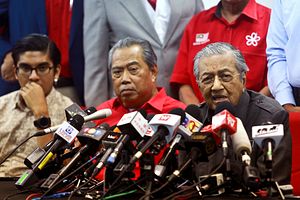On May 9, Mahathir Mohamad led his Pakatan Harapan (PH) coalition to an upset electoral victory, ending over 60 years of continuous parliamentary control by the Barisan Nasional (BN) coalition and marking the first democratic change of power in Malaysia’s history. After previously serving as Malaysia’s prime minister from 1981 to 2003, Mahathir emerged from retirement, changed parties to defeat Najib Razak, and became the world’s oldest elected leader at 92.
Surely the rising cost of living, the introduction of a goods and services tax (GST), Najib’s alleged corruption and mismanagement, and inequities in regional development contributed to BN’s defeat. But Mahathir, voters, and regional observers have, significantly, also marked the Malaysian election as another democratic response to economic encroachment from the Chinese Communist Party’s ominous Belt and Road Initiative (BRI).
Mahathir cautiously refused to declare BRI a problem in the press, but the Chinese debt traps in which Sri Lanka, Pakistan, and other countries have recently been ensnared were undoubtedly on his mind when, in a recent Bloomberg interview, he stated that Sri Lanka had “lost a lot of land” (in Hambantota) because it could not pay back exploitative Chinese loans. To put matters in context, China is Malaysia’s number one source of foreign direct investment (FDI) and Malaysia was the fourth-largest target of Chinese FDI in the world in 2017, up from 20th-largest just two years prior. Malaysia, a claimant to part of the South China Sea (via its East Malaysian states), is committed to tens of billions of dollars in BRI-related megaprojects, one of the largest monetary bonds to China in Asia, including the $17 billion East Coast Rail Link slated for completion in 2024, industrial parks, deep water seaports, and the massive Forest City private residential project in the Iskander Malaysia special economic zone of Johor.
Malaysia’s new prime minister has seemed to understand that geoeconomic correction is required to exorcise his country’s bulging ties to China, which threaten sovereignty and create commercial imbalances as well as contribute to China’s economic growth and the CCP’s military aggrandizement. The day after his election victory, Mahathir stated the PH government could renegotiate several of the unpopular Chinese investment agreements, probably with an eye on the most conspicuous infrastructure schemes. But he would do well to expand the scope of PH’s inquiries to other areas in which the Chinese are maneuvering in Malaysia, most notably in social control.
In late April, the website of China Global Television Network (CGTN), the CCP’s national web-based television broadcaster, ran a report celebrating Alibaba’s City Brain “smart city system” in Kuala Lumpur, the first City Brain artificial intelligence-driven project outside China. Management of Kuala Lumpur’s extensive transit system is merely the start of Alibaba’s intended influence with City Brain in Malaysia. “Businesses, startups, and government agencies will also be able to benefit from the platform,” the CGTN report states. “The capital’s 500 traffic cameras will live stream to Alibaba’s cloud,” it continues. “Industrial partners, startups, research and academic institutes can all share the opportunity to use the creative tools on the City Brain.”
However, if CCP proxies, like Alibaba and Huawei, are involved, and the “creative tools” are anything like those seen in China, Mahathir and Malaysians should be wary. They may become unwitting accomplices to Xi Jinping’s artificial intelligence (AI) strategic plan and crucial sources of data, broadening market penetration by reinforcing the maturation of Chinese technology and helping Chinese authorities overcome cultural biases in the application of AI systems that Chinese military scholars admit to having dual purposes and crucial roles in war.
The surveillance, understanding, and manipulation of Malaysians’ patterns-of-life should be the sovereign and restrained authorities of the Malaysian people’s duly elected representatives, heavily shielded against influence from favored firms of foreign parties with non-market, politically driven obligations. (If Malaysians do not want to become tributaries in China’s retread of Tianxia, that is.) The pattern-of-life information sucked up by Alibaba’s City Brain is technically derived intelligence with value across the spectrum of international relations, from diplomatic discussions to armed conflict. The CCP is keenly aware of its importance, as AI-led pattern-of-life analysis is the nascent backbone of a dystopian social credit system aimed at buttressing the Party’s pervasive protective measures and alleviating its structural insecurities. For emphasis, the Chinese Communist Party’s Global Times newspaper quoted Zhu Zhenming, a professor at the Yunnan Academy of Social Sciences, observing bilateral ties with Malaysia in a manner familiar to racketeers. “China’s trade volume is too large to be ignored. Cooperating with China is not an option but a mutually beneficial trend that cannot be reversed.”
Last month, Malaysians proved the strength of their adherence to democratic processes. Their public representatives should share neither the insecurities of their undemocratic Chinese neighbors nor dominion over their constituents’ activities. Unfortunately, the Malaysian capital’s City Brain shares both. Mahathir should reconsider it.
Nicholas Romero is an active duty U.S. Air Force officer serving in Washington, DC. The opinions expressed above are his own and do not reflect the opinions of the U.S. Air Force, the U.S. Department of Defense, or U.S. government.

































